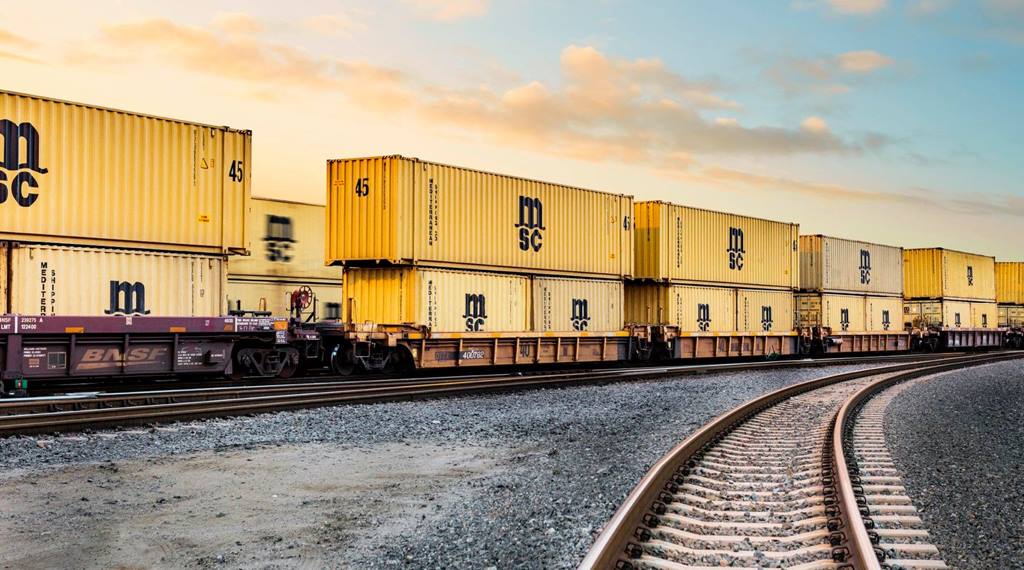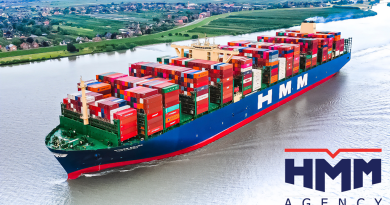Stevica Carapic, managing director of MSC Serbia, Montenegro and North Macedonia – We expect further growth of our company
The family-run MSC Mediterranean Shipping Company, founded in 1970 in Geneva, has turned from a single ship owner into a world leader in container shipping with a fleet of 570 vessels and more than 100,000 employees.
Through a network of 524 offices, MSC operates in 500 ports on 215 trade routes, transporting approximately 21.5 million TEU per year. Late last year, MSC‘s regional office for Serbia, Montenegro, and North Macedonia celebrated its 15th anniversary. Since its establishment in 2005, the MSC office in Belgrade has been providing sea and land services to its customers via ports on the Adriatic (Bar, Rijeka, Koper) and the Eastern Mediterranean (Thessaloniki).
PlutonLogistics had the opportunity to talk to the new managing director, Stevic Carapic, who is in charge of the company’s regional office in Serbia, Montenegro, and North Macedonia.
PL: What are the services you provide to your client in these countries and what is the most important aspect of your business?
– Our company offers shipping services in import and export cargo flows with port coverage in almost all countries of the world, as well as inland transport from/to clients’ warehouses, especially in Serbia and North Macedonia, which are landlocked countries. Also, starting from last year, MSC started offering cargo insurance, which completed our service portfolio. Our local teams can always propose best solutions and routes for any kind of cargo, and also provide full support to their clients ensuring smooth delivery.
PL: What are the main commodities you currently transport?
– You can find all kinds of cargo in our containers – from raw materials to electronic equipment and we are also a leading carrier of temperature controlled cargo in reefer containers, such as berries and meat.
PL: Belgrade office has recently celebrated important anniversary. How did this this journey look for the past fifteen years?
– In general, we can say that past fifteen years were extremely dynamic and interesting. Though the beginning was challenging and unpredictable, MSC managed to take the leading position in Serbia and the region, thanks to our HO support, and the engagement of the whole team of dedicated professionals.
PL: How does MSC see Serbian market and what are your plans for our country? What are your goals for 2021?
– MSC recognizes Serbia’s great potential and growth opportunity. We are dedicated to implementation of innovative services in the regional market. By committing ourselves to digitalisation, improvement of our current services and investing in new equipment and projects, we expect further growth of our company and strengthening our position in the market.

One of our newest global innovations is MSC eBL what is the electronic version of the traditional paper Bill of Lading – the document issued by a carrier to a shipper upon receipt of cargo. It replicates the exact same functions and retains the same legal value of a paper Bill of Lading.
The eBL enables shippers and other key stakeholders in the supply chain to receive and transmit the document electronically, without any change or disruption to day-to-day business operations.
PL: Rail transport plays significant role in your overall service. What is your experience with rail transport in our market?
– For the past several years, rail operators had significant investments in modernizing their services, and it resulted with increasing of overall quality of our service, at the same time ensuring lower delivery costs. In the past period, demand for rails services was significantly increased, and we can expect this trend to continue with further rail service quality increase. We at MSC always strive to increase our flexibility of service, as much as it is possible, especially on inland. Increasing quality of service and opening of several new rail routes in the region is recognized as new asset that is enabling us to offer even more options to our clients.
PL: At the end of last year media worldwide were reporting about issues in maritime transport caused primarily by lack of equipment in China. Has this situation improved by now?
– Cargo flows worldwide were affected by global issue with lack of equipment, but at the same time, our company put in great efforts in equipment repositioning in order to minimize cargo delays.
PL: How did 2020, marked by coronavirus pandemic, look like from the point of view of shipping industry and what is your forecast for the forthcoming months?
– The primary impact of COVID-19 was the impact on the health of our people, both ashore and at sea. MSC campaigns for better recognition of the role of seafarers in keeping global trade moving and has made various appeals to governments to make crew changes easier during the pandemic after hundreds of thousands of sailors got stuck at sea. We continue to advocate for prioritization for these key workers for travel and for COVID vaccinations.
In terms of the market impact, we saw a sudden drop in demand in Q1 2020 as China shut down, followed by an incredible resurgence in demand in the third quarter, and subsequently. The wild swings in demand overwhelmed supply chains and had an unprecedented impact in the systems in which we and our customers operate. Port congestion, equipment shortages and other factors led to a systemic overload of demands on cargo transportation and logistics and even in mid-2021 we are still dealing with this despite the carrier industry having injected capacity and modified service networks. We hope for a return to a more normalized market soon, but we can see these effects continuing a while longer until governments have COVID more under control.
PL: How did using of innovative technology solutions, the assets to which your company is exceptionally dedicated, helped with solving issues in shipping Industry in the past several months?
– Innovative tech solutions played key role in overcoming pandemic-caused issues. Clients were encouraged to use existing digital tools, while new tools were developed and new, alternative procedures were implemented in order to simplify communication and cargo release. MSC will continuously focus on further digital enhancements and investments, to improve our customer journey and overall experience with MSC.





